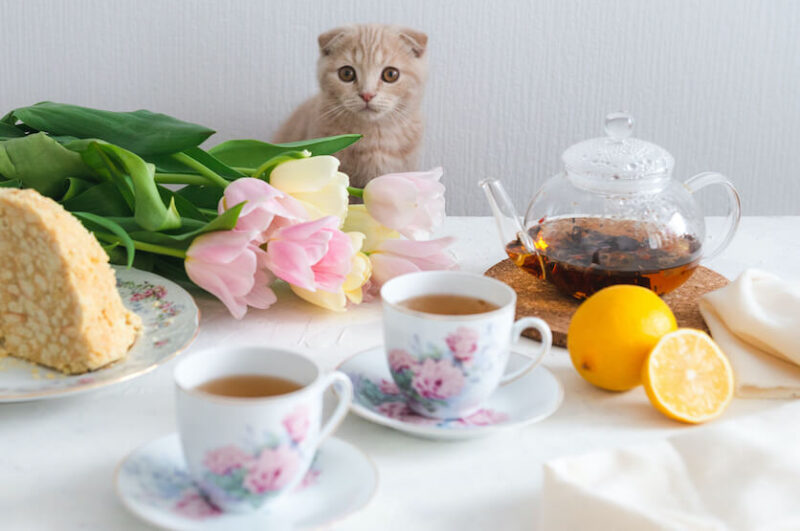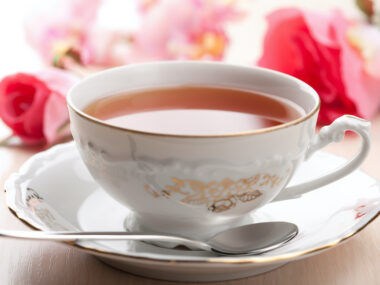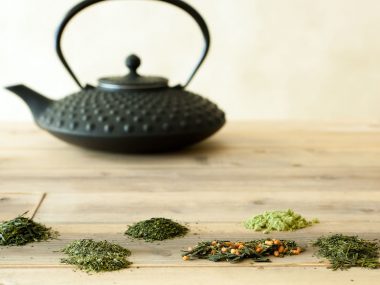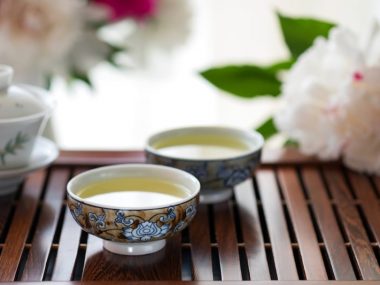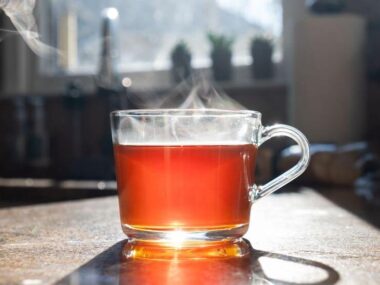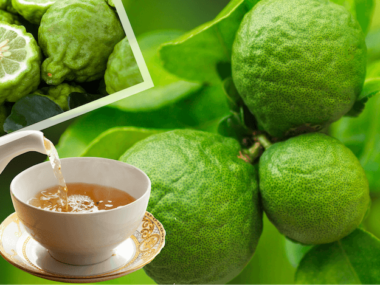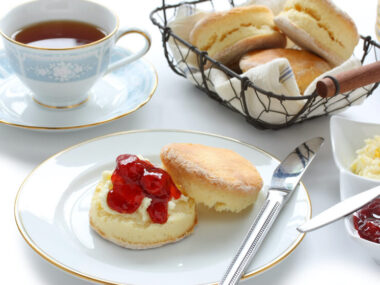How on earth did a tea become known as “English” breakfast tea when it wasn’t even created in England? You’ll be surprised to know just how English Breakfast Tea got its name and where it was created!
Table of Contents
What is English Breakfast Tea?
English breakfast tea is made from a blend of black teas, typically sourced from various plantations in several countries. Depending on what brand of tea you buy, those black teas used for the blend can come from India, Sri Lanka, China, or other parts of the world.
According to The Boston Tea Party Museum, English breakfast tea wasn’t created in England but here in the U.S. in New York back in the 1800s. A small tea company was founded in 1843 by an English apothecary named Richard Davies.
He created a unique blend of teas that included Flowery Pekoe, Pouchong, and China Congou and named it “English Breakfast.” Davies then sold this new tea for fifty cents a pound. The demand for his new tea became increasingly more and more popular. Other tea makers decidedly created their own take on this blend. English breakfast tea may have been the birth child of Davies, but it took off as the tea industry began to market and sell various brand names of this tea.
Today, English breakfast tea typically has a blend of one or more black teas such as Assam (India,) Darjeeling (India,) Ceylon (Sri Lanka,) and Kenyan tea.
What Is A “Breakfast” Tea?
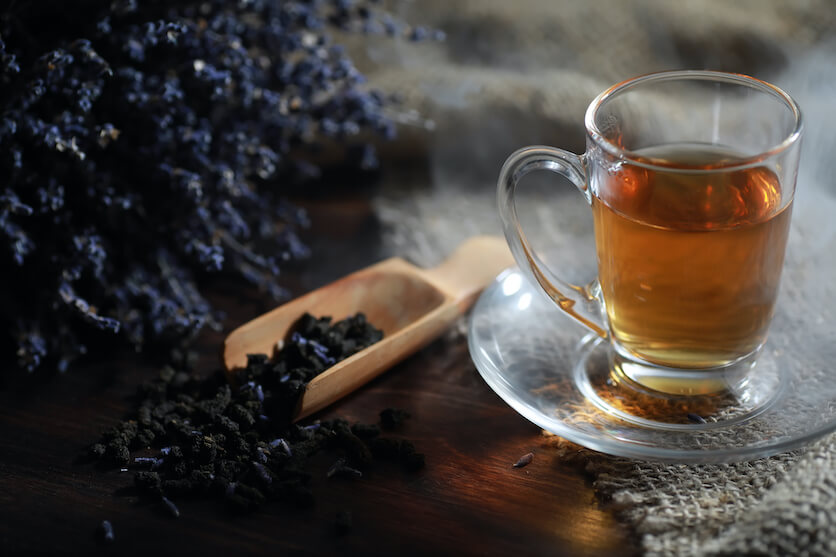
As the name implies, breakfast teas are brews enjoyed in the morning because of the robust, high caffeine kick they provide. Here in the U.S., we are a coffee-drinking nation, and coffee is the beverage of choice for mornings. Interestingly, 75% of Americans prefer coffee over hot tea.
In the U.K. tea still claims the hearts of many. However, coffee leads by 1% as the preferred morning beverage of the British. That just goes to show you that caffeine is the reason we choose to either drink coffee or English breakfast tea in the mornings.
A breakfast tea, however, is a tea enjoyed not only in the morning but afternoons as well. Because it does contain a high amount of caffeine, we wouldn’t recommend drinking English breakfast tea or any other high caffeine tea in the evenings because it may affect getting to sleep.
What Does English Breakfast Tea Taste Like?
English breakfast tea taste is between medium to full-bodied with a robust flavor. Various hints and notes are different in each brand of English breakfast tea because of the differences in the blend of black teas.
Many tea drinkers have described English breakfast tea as bitter, malty, roasty, with slight hints of floral, tannic, and even bland. When you add milk, it creates a honey-nut dimension making the tea much more sweet and palatable.
What’s In English Breakfast Tea?
English breakfast tea is a blend of different black teas that come from the Camellia sinensis plant. These plants are cultivated in various countries and climates. We’ll take a look at the most commonly used black teas (Assam, Ceylon, Kenyan, Keemun) that go into making English breakfast tea.
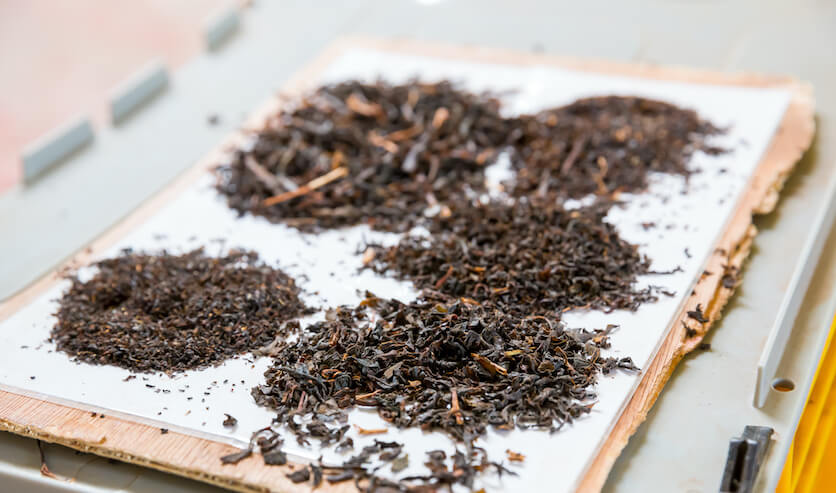
Assam
Assam tea grows in tropical lowlands in the Assam region in India, where the Brahmaputra River flows. The first flush (harvest) produces a malty, chocolatey flavor. Assam tea is enjoyed in its unadulterated form and is also used in tea blends to create other types of tea, such as Earl Grey.
Ceylon
Ceylon tea is cultivated in Sri Lanka, where mountains jut up into the sky. Tea harvesters must carefully balance themselves on the sides of cliffs to pick the delicate tea leaves. Some tea plants are grown at dizzying elevations up to 6,000 feet, where you can look down upon the clouds. The flavor of Ceylon tea is said to be spicy, chocolatey, and citrusy.
Kenyan
Kenya’s black tea plants grow in fields of lush green on tea plantations located in lowland regions. This tea is often used in tea blends to provide a robust base because it’s strong and full-bodied. It is a tea that almost needs milk to tame down its “bite.”
Keemun
Keemun tea is grown only in the Anhui province of China. Many Chinese claim this tea was the first breakfast tea. It is also a tea used in tea blends. However, it is a lighter-bodied black tea with a more delicate taste and isn’t usually used as a base tea. Hints of smoky maltiness come through in flavor with a subtle floral aroma.
Is Earl Grey Tea And English Breakfast Tea The Same Thing?
Both of these teas are made with black tea blends, and both are high in caffeine. However, the thing that sets them apart is the bergamot that’s infused into Earl Grey. English breakfast does not contain any infusions.
How Much Caffeine In English Breakfast Tea?
Black teas are high in caffeine. English breakfast tea caffeine can range from 14mg to 49mg of caffeine in a six-ounce serving. Researchers discovered that brewing times also affect the amount of caffeine. The longer the tea brews, the higher the caffeine.
English breakfast tea caffeine levels vary in brewing times.
- 1-minute brew: 14-19 mg caffeine
- 3-minute brew: 22-39 mg caffeine
- 5-minute brew: 27-49 mg caffeine
What Is English Breakfast Tea Good For?
This tea is a great go-to tea for mornings when you need a little boost to get moving. Most of us consume about eight ounces (or more) of tea or coffee in the morning to get us going. English breakfast provides you with about 47mg of caffeine. When comparing that to coffee, you get about half of the caffeine that coffee provides. However, tea is a healthier alternative.
Black teas are known for the numerous health benefits such as antioxidants, anti-inflammatory, antibacterial, and so much more. This tea contains polyphenols, theaflavins, thearubigins, catechins, and flavonoids. All of them provide you a defense against a number of chronic conditions.
English breakfast tea pairs with many foods, and although it’s typically enjoyed in the mornings, it’s also a popular tea to enjoy with lunch or an afternoon snack.
Is It Okay To Drink English Breakfast Tea Every Day?
Consuming this tea daily is quite safe, provided you follow the recommended daily intake of caffeine (400mg or less per day.) Drinking more than 400mg can cause unwanted side effects:
- Insomnia
- Jitters
- Anxiety
- Rapid heartbeat
- Upset stomach
- Nausea
- Headache
Also, did you know that by drinking black tea daily, you significantly reduce/decrease inflammation? Polyphenols present in black tea play a big role in reducing inflammation associated with osteoarthritis, rheumatoid arthritis, and other chronic conditions.
English Breakfast Tea Benefits
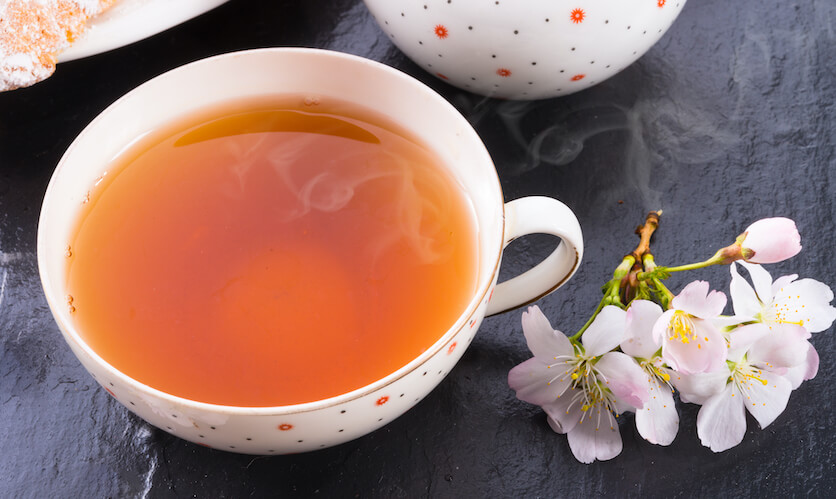
Because English breakfast tea is a blend of black teas, it’s a benefit-packed beverage that’s almost too valuable to pass up. You can enjoy up to six (6-ounce) cups of this tea a day while staying within the recommended daily intake of caffeine.
Heart Health
By drinking black tea regularly, our hearts greatly benefit. The risk of heart disorders and disease is significantly reduced because of drinking tea. High cholesterol and obesity often contribute to heart problems—constituents such as polyphenols and flavonoids in black tea improve cholesterol levels. A big bonus of enjoying black tea regularly is its ability to help us lose weight. By losing weight, our heart greatly benefits.
Helps Us To Lose Weight
Every sip of black tea helps to move you closer to losing those stubborn pounds. Regularly drinking black tea (whether iced or hot), the polyphenols in the tea, encourages the suppression of digesting and absorbing lipids and complex sugars. Lipolysis increased while fat storage decreased. Drinking black tea also helps to curb cravings and hunger. The caffeine in the tea provides you the energy to get moving and be more active!
Lowers Blood Pressure
High blood pressure is common among the elderly, obese, and those who smoke. Heart failure, heart attacks, strokes, atherosclerosis, and other conditions directly related to high blood pressure can be prevented by drinking black tea regularly. Long-term tea drinkers see improvements in their blood pressure. That next cup of black tea may be the one that literally saves your life!
Helps With Diabetes
Black tea catechins are found to improve how our body stores and releases insulin. Blood glucose is reduced while metabolism is encouraged to process sugars more efficiently. A study discovered that drinking black tea after a meal significantly improved sugar levels in patients with diabetes and those who have pre-diabetes. By drinking 3 cups of black tea daily, you lower the risk of developing diabetes.
How to Drink English Breakfast Tea
The name of this tea gets us stuck in the mindset that it is a tea for breakfast. However, we are going to provide you with a few ways to enjoy it throughout the day!
Traditional English Breakfast Tea
Now you can enjoy your tea in true British fashion with milk and sugar.
Ingredients
- 2 cups of water
- 1 teaspoon of loose-leaf English Breakfast Tea (or 1 teabag)
- Milk
- Sugar
Directions
- Bring water to a boil.
- Remove from heat.
Tip: Use a bit of the hot water to bathe your teacup and discard. This warms the teacup making it receptive to pouring the tea in.
- Place loose leaf tea in an infuser and drop it into a teacup or teapot.
- Pour hot water into the teacup/teapot and allow to steep for 5 minutes.
- Remove the infuser.
- Add the desired amount of milk and sugar to taste.
- Enjoy!
English Breakfast Tea – Southern Style
If hot tea isn’t your thing, try it iced.
Ingredients
- 6 cups of warm water
- 2 lemons (sliced)
- ½ cup of loose English breakfast tea
- Large Pitcher
Directions
- Fill a tea pitcher with warm water.
- Add sliced lemons.
- Cover and allow it to sit in the sun for a couple of hours.
- Pour over ice and enjoy!
The “Anytime” Tea
So, now you know English breakfast tea isn’t just for breakfast. The name can be a bit misleading. Just remember that it’s a robust caffeinated tea, and drinking it after 3:00 pm might have you counting sheep that night.
